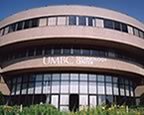|
||||||||||||||||||||||||||||||||||||
|
Aurora is the first company in which UMBC has decided to play a hands-on role, according to Auvil. “Part of UMBC's mission is to promote economic development,” he said. “That's why we're committed to starting companies around university technologies and helping them to be successful.” The technology for detecting seafood spoilage before it can be confirmed by sight or smell was discovered by Aris Kalivretenos, one of Aurora's founders, when he worked for the university as a chemist from 1992 to 1998. Now the university is licensing the technology back to him and his partner Bill LaCourse, who hope to develop various products they can market to the wholesale seafood and restaurant industries. “Our objective is to produce a wafer that will turn a different color when there is spoilage,” said Kalivretenos. The wafer works by detecting the traces of certain chemicals that become prevalent once decay begins to set in. Eventually, the technology could be included in plastic food wraps that would automatically detect the spoilage of the fish or crab meat they cover. “This would be much more reliable, safer and accurate than current sight and smell tests,” Kalivretenos added. As part of its partnership with UMBC, Aurora is housed at the university's technology incubator in Catonsville. The incubator was founded in 1989, expanded in 1996 and has recently become a barometer for gauging a high-tech comeback in the area. For example, four information technology companies have relocated to the center since January, leading some to speculate that the park is capitalizing on a surge for high-tech companies in the Baltimore-Washington corridor. Since the Internet bubble burst in the late 1990s, biotech companies quickly began to outnumber high-tech companies as tenants of UMBC's 41-acre campus. Currently, they make up about 70 percent of the companies leasing space there. However, a surge in funding for homeland security and contract awards from the National Security Agency and the Department of Defense is fueling a comeback for some high-tech companies. While the evidence is largely anecdotal, the fact that high-tech companies have again begun to lease space at the campus is a sign that the high-tech slump is over, according to Ellen Hemmerly, executive director of the university's research park. If Aurora's new seafood spoilage technology becomes a commercial success, it's UMBC's hope that chemical technology firms would also begin flocking to the park. |
|||||||||||||||||||||||||||||||||||
|
bwtech@UMBC Incubator and Accelerator • 1450 South Rolling Road • Baltimore, MD 21227 410.455.5900 • 410.455.5901 fax • techcenter@umbc.edu |
||||||||||||||||||||||||||||||||||||




